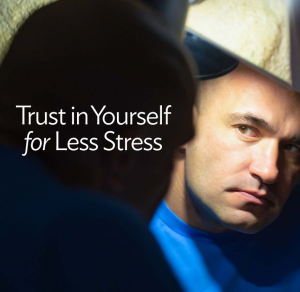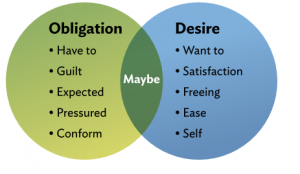*This is an article from the Spring 2022 issue of Contentment Magazine.
By Jen Butler, MEd, BCC, DAIS 
A technology leader received a promotion to manager reflecting his excellent skills, his ability to build relationships with clients and teams, and his sense of what the company needed. After six months, he requested a demotion back to his old level: he hated administration and needed to be closer to the work.
That leader knew what he wanted was far more important than what the company wanted, and he took a major chance that worked out well. As a result, he thrived where he might have failed and years later, he retired stress-free and satisfied.
You may find yourself on a different path—wanting and enjoying that promotion. But whatever direction you take, you have to begin with liking and trusting yourself enough to ask for what you want and the courage to take action. When you stay true to the trust you have in yourself life is more fulfilled and far less stressful.
Step 1. Know Your Decision Gates
Decision gates are what we call those filters that you compare potential decisions against in order to see if you should move forward. Your decision gates are those things held dear to you, the core of who you are. These gates can be people, lifestyles, internal values, mindsets, and more. Things are the things you need in your life to be happy and fulfilled. They are in hierarchical order and if a decision supports your first gate, you move to the second, and so on. With these gates you ask the simple, yet very deep question, “Is this good for X.”
Let’s take the example from above and use that to explain further.
You are offered the promotion to manager and know this will be more responsibility, pressure, and require a lot more energy and effort from you. This decision will definitely change your current work life, so before you accept, you measure the decision against your gates.
- Gate 1- Family Time: Is this promotion going to be good for family time? Will it give me more family time? Will it give me more flexibility with family time? If you can answer in a way that positively supports your family time, then the decision to take the promotion has passed the first gate.
- Gate 2- Cycling: Is this promotion going to be good for my passion with cycling? Will I be able to cycle with my club still? If you can answer positively, you’ve passed the second gate.
- Gate 3- Financial Planning: Is this promotion going to be good for our financial planning? Answer positively, move on.
- Gate 4- Career Development: Is this promotion going to be good for the career development plan I have for myself? Will this add to my resume in a way that I’ll meet my career goals? Will I learn new skills I can apply later in life to achieve my ideal job? Pass? Then, onto last gate.
- Gate 5- Stress Levels: Is this promotion going to be good for my stress levels? Will I be able to manage the added stress that comes with the new role? You honestly know the stress of this will be too much for you and decide to pass on the position.
You may only have three Decision Gates, maybe you have more than five. Whatever the number, you maintain your commitment and clarity for what you want and what’s good for you in your life. You trust yourself to know thyself.
Step 2. Focus on Priorities
Our priorities in life are what we spend our time and energy on and take up much of our mental space. The way you divide your time and energy should reflect your priorities, so at the end of each day you feel productive and your day and life have meaning. Life can intervene, such as being offered a promotion that would shift priorities, and we may have to limit the time and energy we expend on what we love to do. When we have trust in ourselves, in how we are living our lives, and what our priorities are, there is far less stress and a lot less guilt at the end of each day.
Create your priority list and then ask yourself:
- “How long have I been thinking about this?” If a task remains on your list for weeks (months, years), you should consider crossing it off. Completion clearly has little or no effect on your life right now.
- “Why am I doing this? What is the goal? Do I have control over the desired outcome?” If you answer “no” to having control over the outcome, stop. Cross that item off your list. Focus on what you can control.
- “What will it take for me to succeed?” If you lack the resources to succeed at this goal, you need to gather the resources first. If the item is too large (“run a marathon”), break it into doable pieces (“run 1 mile”).
- “What happens if I chose not to do it right now?” Check in with yourself on how important the task is right now. When you have trouble saying no or you give every obligation the same weight, you are courting stress.
You will probably find that when intentional thought is given to why something is on your priority list, you’ll have a much shorter priority list.
Step 3. The Power of Your Response
People ask favors that can step over what you feel is a boundary or requests that push you out of comfort zones. We often say “yes” out of misdirected impulses such as fear of conflict, people pleasing, or simply not realizing you have another option. You don’t have to say “yes” if it causes you to go against what you trust about yourself.
When you put everyone’s needs before your own, you begin to believe that saying “no” makes you a bad, rude, or selfish person. Learning to say “no” is realizing that you are valuable and that your needs are vastly important as well. Saying “no” is a great option so you don’t compromise.
Many people think in “yes/no,” so when a request is placed upon them, they don’t see the all of the other options available to them. They only respond in the binary, missing out on other solutions that could create win-win-win situations; they forget about “maybe.”

TIP: A common block for people in saying “no” is they don’t know how to say it. The power of “no” is in stating clearly to others what is okay and what is not okay. Here are some tips to harness the power of “no” and reduce stress in your life:
- Be brief. Avoid elaborate justifications or explanations.
- Be respectful and be polite. But remember, “no” is a complete sentence.
- Be honest. Fabricating reasons to refuse a request will only create the stress you are trying not to have.
Step 4. Accept That You Will Fail—and Succeed
No matter how often we are told that failure is a learning experience, it is still a painful learning experience and one that increases our stress levels. For some people, success itself is a failure, igniting the stress of surpassing or leaving behind their peers, challenging values they thought were important to them, and triggering the sense that they are unworthy.
Your own sense of failure may not align with anyone else’s, but that doesn’t make it less real.
- Learn your stress response to success and failure. The sooner you become aware that you are stressed, the easier it will be to find a coping method and the faster you will return to balance.
- Separate who you are from what you do. One mistake does not make you a bad person, and solutions are more important than finger-pointing. That’s a lesson you may be communicating to your team; now it’s time to apply it to yourself.
- Commit to not going it alone. Whether you confide in family or friends, see a coach or consultant, gain a mentor, or visit a therapist, you should commit to accepting help from day one.
- Focus on one thing you would change as a result. Make one change, form one new habit, and then move onto the next thing. Start with the easiest or the one that will make the most impact in your life; it doesn’t matter which. It’s the process of changing that makes the difference.
Step 5. Reward Yourself
There’s an app for that. Really. You can now set your phone to remind you of your priorities, track your steps toward liking yourself, display your progress in lush graphics, and reward you with beautiful displays or badges.
Whether liking yourself involves refusing yet another committee chair, increasing exercise, not yelling at your team or your family, or finding time to relax, these apps will help get you there.
But don’t forget the power of rewarding yourself in real life. A reward can range from buying a scarf to replacing a whole wardrobe; it can be a walk around the block or a vacation in Europe. Whatever works for you.
ABOUT THE AUTHOR

Jen Butler is the owner, founder, and CEO of JB Partners, a company committed to reducing stress of private-practice owners, small businesses, and large organizations through intuitive and powerful programming, one-to-one coaching, and comprehensive consulting.
While earning two bachelor’s degrees – one in Public Health Administration and the other in Educational Psychology – Jen worked in hospitals, private practices, and became a paramedic, learning first-hand the challenges and relentless stress faced by medical professionals. Building on her education and 25-years of experience in learning & development, Jen Butler has worked with entrepreneurs, small business owners, corporate leaders, and executives on how to obtain sustainable profitability with less stress and more fulfillment. Jen is also a Diplomate of The American Institute of Stress. If you would like to learn more about the great programs at JB partners just go to jbpartners.com.
Contentment Magazine
The dictionary defines “content” as being in a state of peaceful happiness. The AIS magazine is called Contentment because we want all of our guests and members to find contentment in their lives by learning about stress management and finding what works best for each them. Stress is unavoidable, and comes in many shapes and sizes that makes being in a state of peaceful happiness seem like a very lofty goal. But happiness is easy to find once you are able to find ways to manage your stress and keep a healthy perspective when going though difficult times in life. You will always have stress, but stress does not always have you!

Leave A Comment
You must be logged in to post a comment.